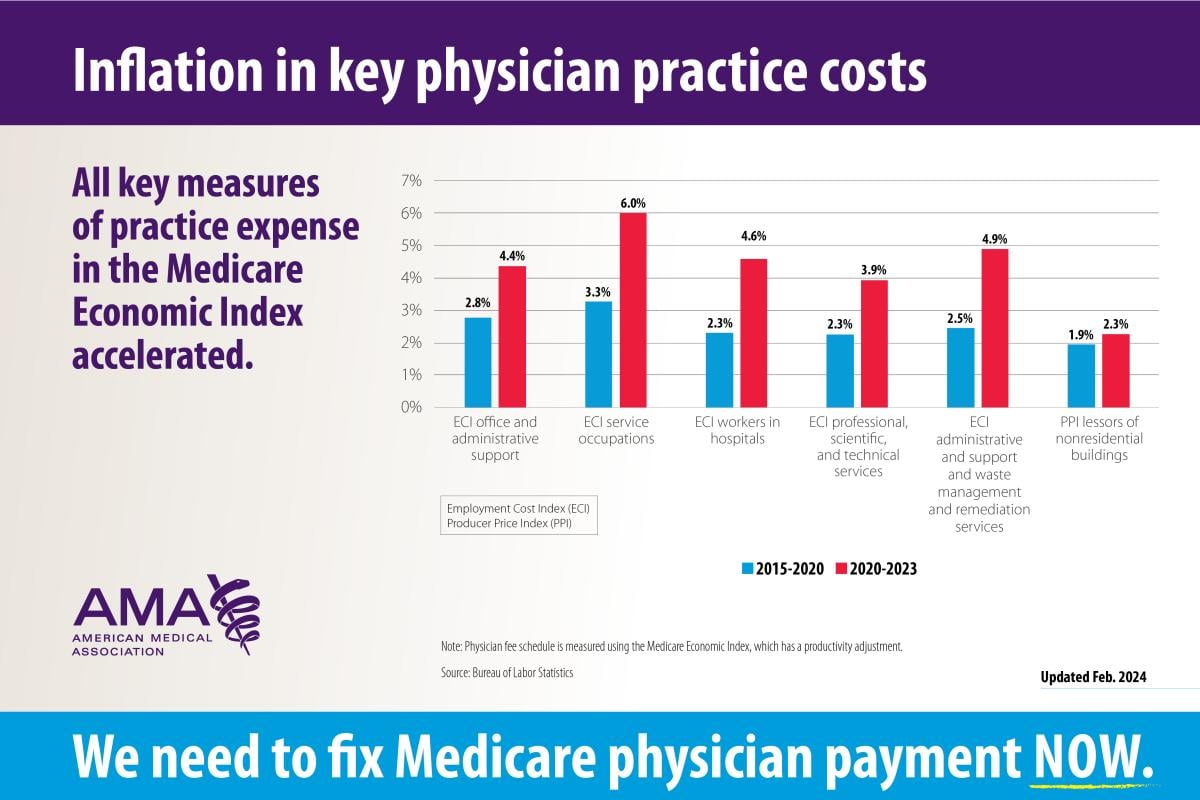A short-term funding bill unveiled over the weekend entirely fails to address Medicare physician payment cuts that are endangering the medical practices that deliver high-quality care to older adult patients nationwide.
“Physicians across the country are outraged that Congress’s proposed spending package locks in a devastating fifth consecutive year of Medicare cuts, threatening access to care for 66 million Medicare patients,” said AMA President Bruce A. Scott, MD, an otolaryngologist in Louisville, Kentucky. “Despite repeated warnings, lawmakers are once again ignoring the dire consequences of these cuts and their impact both on patients and the private practices struggling to keep their doors open.”
In his statement issued Sunday, Dr. Scott added that the “decision to allow the 2.8% cut to go forward is particularly devastating for rural and underserved communities. These physicians and their patients have borne the brunt of the rising practice costs—3.5% this year, according to Medicare’s own estimate.”
Learn more with the AMA about how Medicare pay cuts threaten patients’ access to care.
After adjusting for the inflation in practice costs, Medicare payment to physician practices has dropped 33% (PDF) since 2001.
“Let me be clear: These unsustainable cuts will force more practices to close and leave patients with fewer options for care. ... Medicare patients will pay the price,” said Dr. Scott, who has seen the effects firsthand.
“Two of my partners have given up,” he noted regretfully in an interview last month that touched on the impact of Medicare pay cuts and prior authorization. “And as of Jan. 1, they're leaving private practice, and they're going to become employed. Not because they want to leave private practice—but because of the challenges that we're talking about.”
Still time to act
The short-term funding proposal that fails to address Medicare physician payment cuts came just days after the experts at the Medicare Payment Advisory Commission (MedPAC) sent a strong signal that they will soon back indefinitely linking payment updates for physician practices to the growth in the cost of providing care—a position long championed by the AMA.
“It just makes sense that payment must keep pace with increasing costs,” Dr. Scott said in a statement. “Other providers already have automatic, yearly updates, and physicians are the foundation of health care.”
MedPAC is likely to vote on these policy recommendations next month. In the meantime, Congress still has a chance to reverse the Jan. 1 cut this week, which is the deadline for Capitol Hill to fund the federal government through the end of the fiscal year. At the end of 2024, the previous Congress passed a scaled-back continuing resolution to keep the government running and language that would have stopped the physician Medicare payment cut was removed from the bill.
A bipartisan group of 10 House members introduced a bill in late January to stop the 2.8% cut, while providing a 2% payment update. The AMA is leading the charge to reform the Medicare payment system and strongly supports the legislation, which had garnered over 100 co-sponsors at this article’s deadline.
The AMA has been working with members of Congress to include it in the legislation to fund the federal government beyond the March 14 statutory deadline. Patients and doctors across the nation have generated more than half a million messages to Congress as part the AMA’s Fix Medicare Now campaign. Send your message to Congress today.
“The window to reverse this reckless decision is rapidly closing,” Dr. Scott said. “Lawmakers must explain either why protecting access to quality health care is not a priority or how they plan to fix it.”





